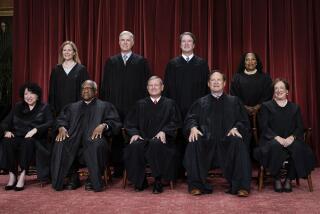Audit Cites Travel Costs of Commerce Secretary
- Share via
WASHINGTON — Under Commerce Secretary Ronald H. Brown, travel expenses for the secretary’s office have risen at least 145% over those of a well-traveled GOP predecessor, while many of Brown’s aides are improperly using government credit cards for personal purchases, according to a confidential audit report obtained by The Times.
The report by the Commerce Department’s inspector general also sharply criticizes Brown for supplementing his escalating travel budget with millions of dollars that Congress intended for other purposes.
In addition, it questions the Commerce Department’s practice of paying in advance the expenses of nongovernment workers who travel as “consultants” for the administration. It notes that more than $360,000 in travel advances to these private citizens have never been repaid.
The report, which generally calls into question Brown’s financial management of the Commerce Department, comes to light in the wake of the controversy over excessive travel spending by Energy Secretary Hazel O’Leary, whose penchant for numerous and expensive foreign trips was detailed by The Times.
Brown is already under investigation by a court-appointed independent counsel on a variety of charges unrelated to his travel expenditures--most of them involving his personal finances.
His spending levels are particularly striking since he took over the job from a Republican administration that was often under fire for incurring excessive travel costs. In particular, the extensive travels of former Commerce Secretary Robert A. Mosbacher, who served in the Bush administration, were often questioned by Democrats in Congress.
Like Mosbacher, Brown, a former chairman of the Democratic Party, was accused by his critics of using his travel budget to gain favor with political allies and party contributors, many of whom have been invited to accompany the secretary on his extensive foreign trips.
Carol Hamilton, Brown’s press secretary, said the increased spending reflects the secretary’s determination to be more of an activist than his predecessors in promoting the interests of American business.
“The Brown Department of Commerce is a far more activist Commerce Department, particularly in terms of export promotion,” she said.
At the same time, she said, the department has taken steps to clamp down on the misuse of credit cards and to eliminate other problems cited by the auditors.
Judging from individual expense reports filed by Brown and his traveling companions, which also were obtained by The Times, the Commerce secretary’s costs have risen in part because he makes numerous domestic and foreign trips. But records also show that he adds to the cost by taking along a sizable entourage of advisors and security personnel, along with an advance team whose tasks include arranging for hotel accommodations and ground transportation.
*
Overall, according to the audit, travels by Commerce Department employees cost the taxpayers nearly $68 million in 1994, exceeding the budget set by Congress by about 55%. One Commerce Department agency alone, the National Oceanic and Atmospheric Administration--which helps pay for Brown’s trips--exceeded its travel budget by $22 million in 1994.
Auditors found that the secretary and his office staff spent nearly $1.4 million from their own budget on travel during 1994, nearly 1 1/2 times more than the $552,389 spent in 1991 by Mosbacher and his aides.
In addition, auditors found, the secretary has supplemented his travel budget with hundreds of thousands of dollars drawn from other agencies within his department, including NOAA, the International Trade Administration and the Economic Development Administration.
For example, the report says the ITA and the EDA transferred funds from their budgets to pay for Brown’s trips to Russia in March 1994 and to India in January 1995. Records indicate that NOAA routinely pays for Brown’s bodyguards, both on foreign and domestic trips.
*
As a result of Brown’s decision to use other agencies’ funds for his trips, auditors were unable to determine precisely how much money the secretary has spent on travel. But the report quotes ITA officials as saying his travel expenditures from their budget reached $2 million in 1994 alone.
The inspector general’s office says the practice of transferring funds between agencies was troublesome, but not illegal. “We found no violation of the letter of the appropriations law,” the report says. “But we are concerned that the transfers weaken the integrity of the budgeting and appropriation process and expend funds in ways not anticipated by Congress.”
Hamilton said Brown disagrees with the inspector general’s criticism.
The report was first obtained from the Commerce Department by Citizens Against Government Waste, a conservative, Washington-based watchdog group, and the inspector general’s office has declined further comment on it.
But on Capitol Hill, where decisions about Brown’s travel budget are made, a spokesman for Rep. William F. Clinger Jr. (R-Pa.), chairman of the House Government Reform and Oversight Committee, expressed strong dissatisfaction with Commerce Department spending practices.
Brown’s travel spending, he said, appears to be “in violation of Congress’ power of the purse.” Clinger, who also has a copy of the audit report, added that Americans would prefer to have their economic development funds spent on local community projects, not on foreign trips for Brown.
The auditors found widespread abuse of government credit cards within the Commerce Department, including “unpaid charges, use of charge card for personal purchases and automated teller machine advances not related to official travel.” Among those issued these credit cards, according to Hamilton, are some nongovernment workers--some of them political associates of Brown--who are hired as consultants to accompany the secretary on his trips, often to make advance arrangements.
Specifically, they identified 293 employees with delinquent accounts and 567 who had used the card for ATM advances or personal charges, such as meals at fancy Washington restaurants, liquor, jewelry, flowers, books and music, online service fees and automobile insurance.
Hamilton described the problem as simply a “bookkeeping issue” and said department administrators have assured Brown that the money was not “inappropriately spent.”
*
When confronted by the inspector general with these apparent abuses of government credit cards, according to the audit report, most agencies within the Commerce Department appear to have made a good-faith effort to ferret out the problem and respond in writing.
But Brown’s own office appears to have been less cooperative. The report notes: “The coordinator in the office of the secretary gave us oral explanations for some of the questionable accounts, but told us that because of other pressing duties, she did not have sufficient time to provide written explanations.”
At NOAA, the expense account coordinator complained that she could not possibly do a thorough job of monitoring credit card expenditures because she was the only person responsible for 5,000 to 6,000 cardholders.
Although the department subsequently made arrangements with American Express Co. to automatically block retail expenditures made with a government credit card, the inspector general noted that the system was far from foolproof.
The Commerce Department’s efforts to collect repayments of travel advances from consultants also have been inadequate, according to the report. As of March 31, 1995, these nongovernment personnel had received 525 advance payments totaling $360,110 that had never been repaid.
Of the 83 nongovernment workers who traveled with the Commerce Department between 1992 and 1994, the report says, only two of them repaid their travel advances in full. While most of them made some accounting of their expenditures, however inadequate, nine of them filed no vouchers.
The report says 260 of the advances, totaling $119,552, were more than a year old and probably uncollectable. Recipients of 367 advances, totaling $195,861, had ignored four government notices seeking repayment.
Perhaps the harshest criticism leveled in the inspector general’s report points to a lack of concern within the Commerce Department about these matters of financial management. “Oversight of travel spending by agencies appears virtually nonexistent beyond the commitment of funds,” it concludes.
More to Read
Sign up for Essential California
The most important California stories and recommendations in your inbox every morning.
You may occasionally receive promotional content from the Los Angeles Times.













